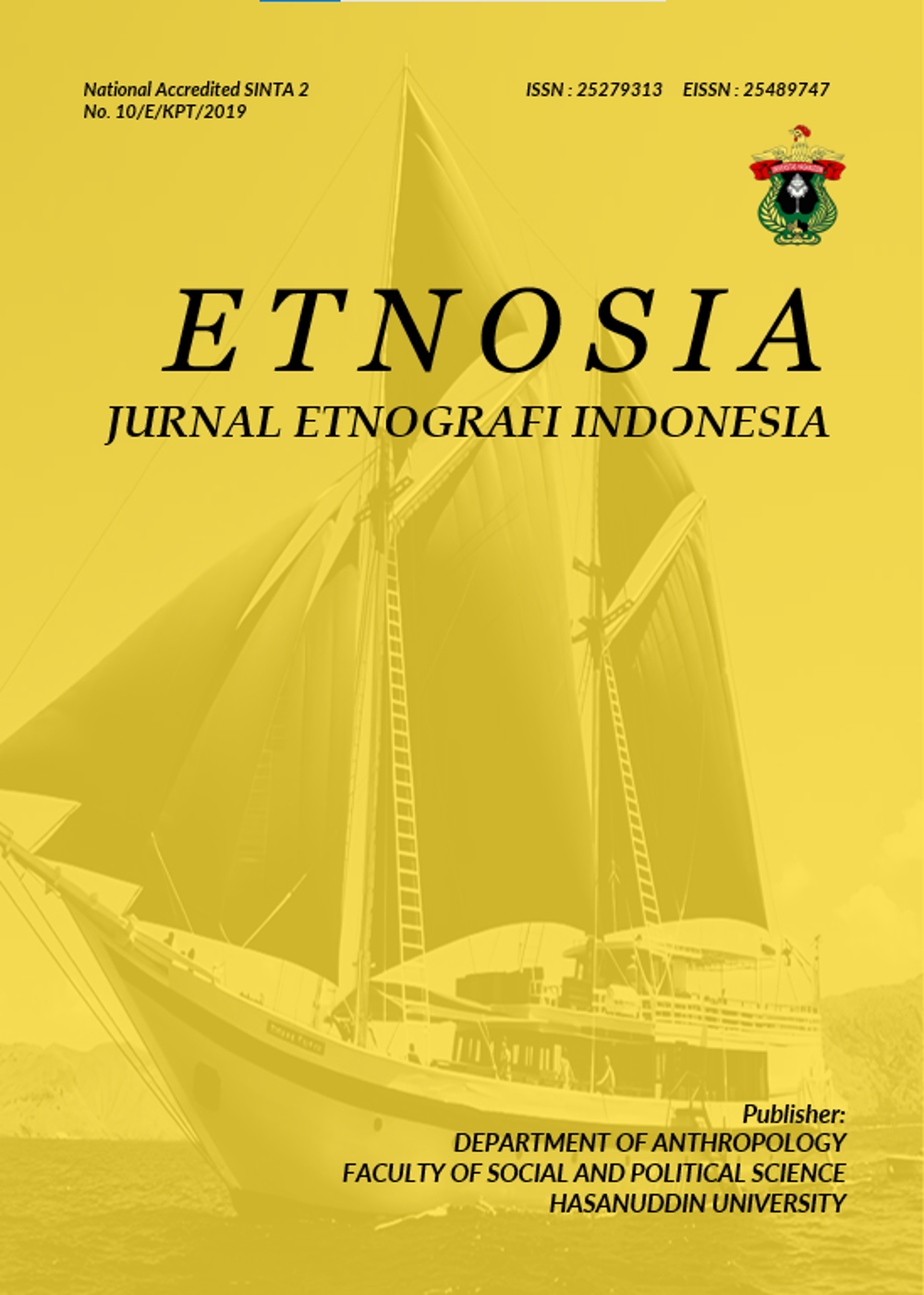Abstract
Clean water is one of Indonesia's main problems, particularly at the village level. The Pansimas program, facilitated by the central government, has become the primary plan to solve the problem. The central government targets 100% complete filled to the need for clean water throughout the territories. This article deals with the dynamic of the Pamsimas program's process to overcome such a problem from the grassroots level. This study was conducted at Borikamase Village, Maros Regency. Data were collected using in-depth interviews with twelve informants from various backgrounds (village head, government officials, partnership community, facilitators, non-governmental organization, public figure, religious leader, and targetted community). The study indicates that it is complicated to get clean water in Borikamase. The limitation of clean water in the village resulted in high community protection of their village's water source from outsiders. Therefore, water sources are locally termed bulaeng je'ne (golden water), which means that clean water is considered highly valued. However, It is challenging to overcome the crisis of clean water in the village because of the lack of mutual motivation among community members. This mutual motivation consists of mutual trust, mutual understanding, mutual recognition, and commitment. Therefore, it needs to strengthen the collaboration between the government and the community being targeted to the program to solve the need for clean water.References
Agranoff, R. dan Mc.Guire, M. (2007). “Inside the Matrix: IntegratingtheParadigmsofInter-governmental and Network Management,” International Journal of Public Administrtation, 26(12):1401-1422, https://www.tandfonline.com/doi/full/10.1081/PAD-120024403, diakses tanggal 11 Desember 2020.
Ansell, C. and Gash, A. (2007). “Collaborative Governance in TheoryandPractice”, JournalofPublicAdministrationResearch&Theory”, 18(4):543-571, https://www.semanticscholar.org/paper/Collaborative-Governance-in-Theory-and-Practice-Ansell-Gash/4b69c75f85cc6a2ba7bf4e1e819e17cfaf4a288f, diakses tanggal 1 Desember 2020.
Astuti, M. T. dan Rahdriawan, M. (2013). “Evaluasi Pengelolaan Program Pamsimas Di Lingkungan Permukiman Kecamatan Mijen, Semarang”, Jurnal Teknik Pembangunan dan Kota, 2(4):938-947, https://ejournal3.undip.ac.id/index.php/pwk/article/view/3544, diakses tanggal 3 Desember 2020.
Bachtiar. (2016). Manajemen Kolaborasi Sektor Publik: Studi Dukungan Dalam Pencapaian Overstock Beras Dua Juta Ton Antara Pemerintah Provinsi Sulawesi Selatan dengan Kodam VII/Wirabuana. Fakultas Ilmu Sosial dan Ilmu Politik, Universitas Hasanuddin Makassar.
Bryson, J. M.; Crosby, Barbara. C.;dan Stone, M.M. (2006). “The Design and Implementation of Cross-Sector Collaborations,” Public Administration Review, 66(1):44-55, https://www.scirp.org/(S(i43dyn45teexjx455qlt3d2q))/reference/ReferencesPapers.aspx?ReferenceID=1282968, diakses tanggal 24 November 2020.
Coleman, J. S. (1988). “Social Capital in theCreationof Human Capital,” American Journal of Sosiology,94:95-120, https://www.socialcapitalgateway.org/content/paper/coleman-j-s-1988-social-capital-creation-human-capital-american-journal-sociology-94-s, diakses tanggal 19 Agustus 2020.
Donahue J. D dan Zeckhauser, R. J. (2011). Collaborative Governance Private Roles for Public Goals in Turbulent Times. New York: PrincentonUniversityPress.
Emerson, K.; Nabachi, T.; dan Balogh, S. (2012).“An Integrative Framework for Collaborative Governance”, Journal of Public Administration Research and Theory”, 22(1):1–29, https://academic.oup.com/jpart/article/22/1/1/944908, diakses tanggal 03 Juli 2020.
Emerson, K. Dan Nabachi, T. (2015). Collaborative Governance Regime. George Town: University Press of USA.
Fitriyani, N. dan Rahdriawan, M. (2015). “Evaluasi Pemanfaatan Air Bersih Program Pamsimas di Kecamatan Tembalang”, Jurnal Pengembangan Kota, 3(2), https://ejournal2.undip.ac.id/index.php/jpk/article/view/90/920, diakses tanggal 20 Januari 2021.
Insani, S. dan Satlita, L. (2016). Efektifitas Penyediaan Air Minum dan Sanitasi Berbasis Masyarakat (Pamsimas) di Temanggung. Yogyakarta: AN FIS UNY.
Islamy L.O.S. (2017).Model Collaborative Governance dalam Pengembangan Pariwisata di Kabupaten Buton, Fakultas Ilmu Sosial dan Ilmu Politik, Universitas Hasanuddin, Makassar.
Kholiq, A. (2014). “Evaluasi Keberhasilan Program Air Minum dan Sanitasi (Pamsimas) di Kabupaten Tegal dan Kabupaten Brebes”, Jurnal Ilmu dan Terapan Bidang Tehnik Sipil, 20(2):125-133, https://ejournal.undip.ac.id/index.php/mkts/article/view/9254, diakses tanggal 15 Oktober 2020.
Nengsi, S. (2018). “ Analisis Keberlangsungan Program Penyediaan Air Minum Dan Sanitasi Berbasis Masyarakat (Pasca Pamsimas) di Desa Lilli Kecamatan Matangnga Kabupaten Polewali Mandar”, Jurnal Kesehatan Masyarakat, Mei, 4(1):33-42, https://media.neliti.com/media/publications/283710-analisis-keberlangsung-program-penyediaa-95378cb4.pdf, diakses tanggal 15 November 2020.
Nurjaya, M. (2020). Colaborative Governance pada Program Penyediaan Air Minum dan Sanitasi Berbasis Masyarakat (Pamsimas) di Kabupaten Maros. Fakultas Ilmu Sosial dan Ilmu Politik, Universitas Hasanuddin, Makassar.
Juknis Pamsimas (Petunjuk Teknis Pelaksanaan Program Penyediaan Air Minum dan Sanitasi Berbasis Masyarakat). (2018). Jakarta: Kementrian Pekerjaan Umum.
Putnam, R. (1993). Making Democracy Work: Civic. Tradition in modern Italy. Princeton: Princeton UniversityPress.

This work is licensed under a Creative Commons Attribution-NonCommercial 4.0 International License.
Copyright (c) 2021 ETNOSIA : Jurnal Etnografi Indonesia





